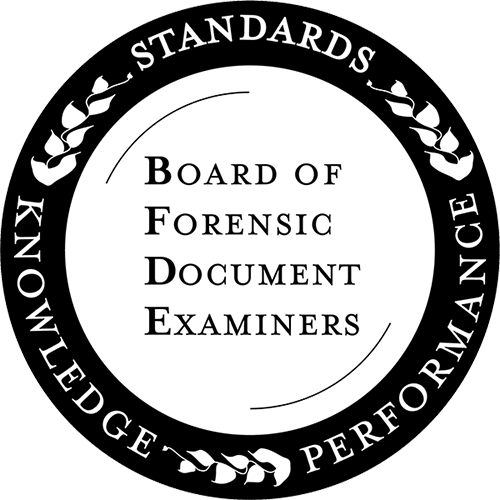Board of Forensic Document Examiners
TEST CURRICULUM
The BFDE examinations were developed under the guidance of Occupational Research and Assessment, Inc. , (ORA) a professional testing development company. The eight-phase process included an occupational and task analysis, development of a testing curriculum, validation of the content of the curriculum through an international survey of document examiners, test item writing and coding, item validation, test construction, pilot testing, and, finally setting the cut score required to pass the examination.
Base of Knowledge
The base of knowledge for the written examination is the scope of work performed by a forensic document examiner as defined in ASTM E 444 and as further defined by the Forensic Document Examiners Task Inventory published by the BFDE.
The base of knowledge for the written examination is the scope of work performed by a forensic document examiner as defined in ASTM E 444 and as further defined by the Forensic Document Examiners Task Inventory published by the BFDE.
Forensic Document Examiners Task Inventory
A. Foundation Skills
Knowledge of handwriting methodology, handwriting characteristics, printing characteristics, inks, writing instruments, fonts, type styles, paper, printing devices, forms and letterheads, comparative analysis techniques, ethics and professionalism.
B. Gathering Evidence
Chain of custody, standards of comparison, document data, document formatting
C. Analyze Handwriting
Cursive writing, signatures, hand printing, numerals, influences on handwriting, influences on letter design, disguised writing, direction of movement, line sequences.
D. Analyze Falsified Documents
Document altering techniques, counterfeit documents, fabricated documents
E. Analyze Features of Paper and Media
Characteristics of watermarks and paper, production characteristics of paper, physical characteristics of paper.
F. Analyze Impact and Non-Impact Images
Copy machines, fax machines, typewriters, latent images, printers, imaging devices (rubber stamps...), non-impact pre-printed, security features
G. Use of Laboratory Instruments
Use of microscopes, magnifiers, video spectrum devices, electrostatic devices, photography, light sources, measuring devices, other equipment applicable to document problems
H. Evaluating Evidence and Presenting Case Findings
Evaluate analyses performed, expressing opinions, preparing reports, preparing for testimony
I. Demonstrate Knowledge of Legal Procedures
Defining legal terms, legal proceedings, legal precedents regarding document examination
Knowledge of handwriting methodology, handwriting characteristics, printing characteristics, inks, writing instruments, fonts, type styles, paper, printing devices, forms and letterheads, comparative analysis techniques, ethics and professionalism.
B. Gathering Evidence
Chain of custody, standards of comparison, document data, document formatting
C. Analyze Handwriting
Cursive writing, signatures, hand printing, numerals, influences on handwriting, influences on letter design, disguised writing, direction of movement, line sequences.
D. Analyze Falsified Documents
Document altering techniques, counterfeit documents, fabricated documents
E. Analyze Features of Paper and Media
Characteristics of watermarks and paper, production characteristics of paper, physical characteristics of paper.
F. Analyze Impact and Non-Impact Images
Copy machines, fax machines, typewriters, latent images, printers, imaging devices (rubber stamps...), non-impact pre-printed, security features
G. Use of Laboratory Instruments
Use of microscopes, magnifiers, video spectrum devices, electrostatic devices, photography, light sources, measuring devices, other equipment applicable to document problems
H. Evaluating Evidence and Presenting Case Findings
Evaluate analyses performed, expressing opinions, preparing reports, preparing for testimony
I. Demonstrate Knowledge of Legal Procedures
Defining legal terms, legal proceedings, legal precedents regarding document examination
